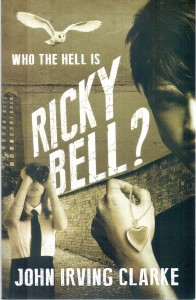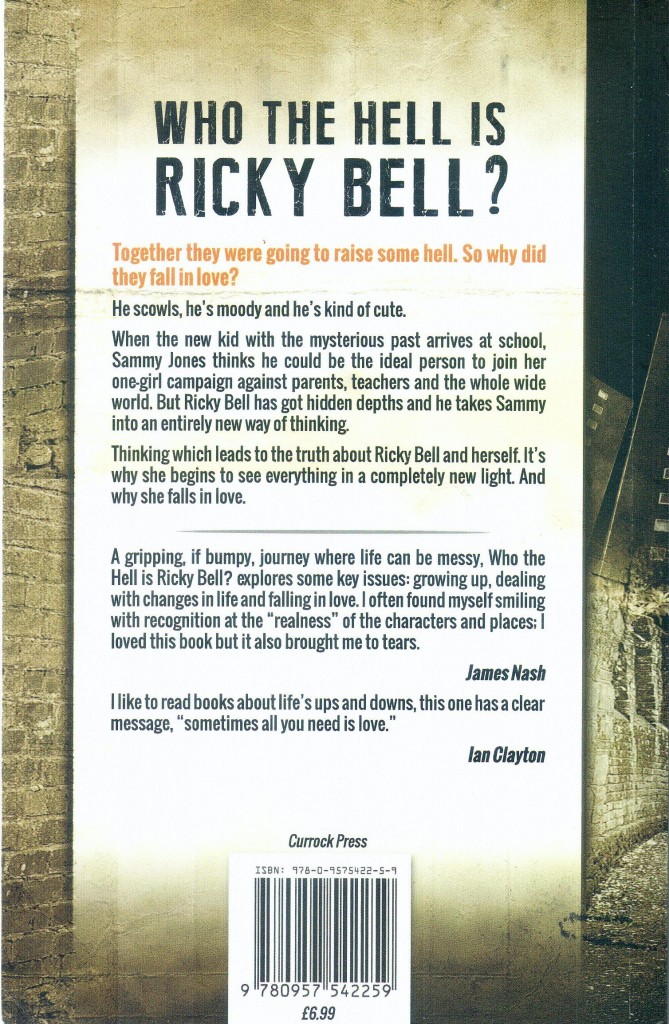(SILVIA PIO, edited by)
«To be honest, when I first saw him there was something that turned me off, but I have to admit that there was something that turned me very much on. Mmm… Because he was new, I suppose, he was the centre of attraction and a gang of kids trailed around after him at break and lunchtime, asking questions, telling him stuff, trying to find out whether he could become a good mate or not. The answer was no. Ricky didn’t like any fuss, preferring to keep himself to himself, minding his own business and going his own way, scowling at the world. Soon, everyone got fed up and drifted away, leaving him to mooch around like a lost dog.
Ricky Bell. Every time we bumped into each other he would tell me to push off or worse. But in a strange way he was kind of cute. I’m sure if he swept that long hair out of his eyes and allowed himself to smile occasionally, people would warm to him. I decided that I didn’t care about the rumours that wouldn’t be shooed away: assault? Court appearances? Expulsion? These were the words that whispered in the wind wherever he went. So what? I thought he was cute and he also had some devil in him. He looked like he was ready to raise some hell: me and him together raising hell. There’s a thought; we would make everyone sit up and take notice.
But first things first, all he had to do was let those deep brown eyes meet mine, let his mouth broaden into just the hint of a smile, and I would ask him out.»
(Opening of the novel)
An interview with the author
John, is this your first novel?
Strictly speaking, no, this is not my first novel. Many years ago I wrote a novel also based on two young people who were from very different social classes. The male protagonist has a police record and this eventually emerges to jeopardise the relationship between the pair. I made two hard copies of the novel and at separate times I lent them to two friends one of whom I lost touch with and the other who now lives abroad. The software I used is now obsolete and so is the computer on which I wrote it. So I’m afraid the novel is now lost for all time. If my memory is correct, this is no great loss to literature as the novel lacked an abrasive quality; there was little in the way of conflict and all of the characters tended towards being good guys.
How long did you take to write it?
I began writing the novel in the Summer of 2009. The initial chapters stemmed from stimulus material I used to use in the classroom with a class of fourteen year olds. I was trying to write provocative material which was close to their experience and which would stimulate discussion in lessons. As the school broke up for the Summer I took the pieces on holiday with me because I had become intrigued myself: who was this new guy Ricky Bell who had mysteriously turned up at school? I wanted to write and find out. I wrote during the summer holidays and brought it home with me to complete. If my memory serves me well, I had finished the manuscript by December of that year.
What relationship is there between the novel’s characters and the characters in your short stories I Was Ready to Fall in Love?
The relationship between the characters in the novel and those in the short stories is that they are wrestling with the same problem: the tricky business of love and maintaining trust and honesty in relationships. Most of the short stories are bleak in their outlook whereas many people have commented on the note of optimism at the end of Who the Hell is Ricky Bell?
This must be the question everybody is asking you: who the hell is Ricky Bell?
Even at the end of the novel I think this is still a legitimate question. If anything, we learn much more about the female character Sammy whose initial hard-faced behaviour is clearly not a true reflection of her inner qualities. But Ricky, who is responsible for so much of the development in Sammy, remains something of an enigma. Where does a sixteen year old acquire such maturity and balanced outlook on life? And how well has he dealt with his own demons? Who is this guy? What I do know is that as the author, I became very fond of these two characters. Sometimes one might find oneself disapproving of someone’s behaviour but that doesn’t mean that the characters are any less likeable.
And now what is going to happen?
This is the question I am always keen to ask people who have read the book. Romantics, I suspect, see a golden future for Ricky and Sammy whereas those of a more hard-bitten outlook may think that the events of the novel will be too difficult for the characters to overcome. It is the first serious relationship for both of these characters and realists may ask how often do first relationships sustain in real life? But as there is no sequel and no plans to write a sequel just yet, readers are entitled to plot out their own futures for Ricky and Sammy.
http://www.currockpress.com/who-the-hell-is-ricky-bell.html
Who The Hell is Ricky Bell, Currock Press, is available at Amazon
In the Italian page there is a translation of Chapter 5 of the book.
John I. Clarke’s poetry and short stories in Margutte can be reached through the tag with the author’s name.



